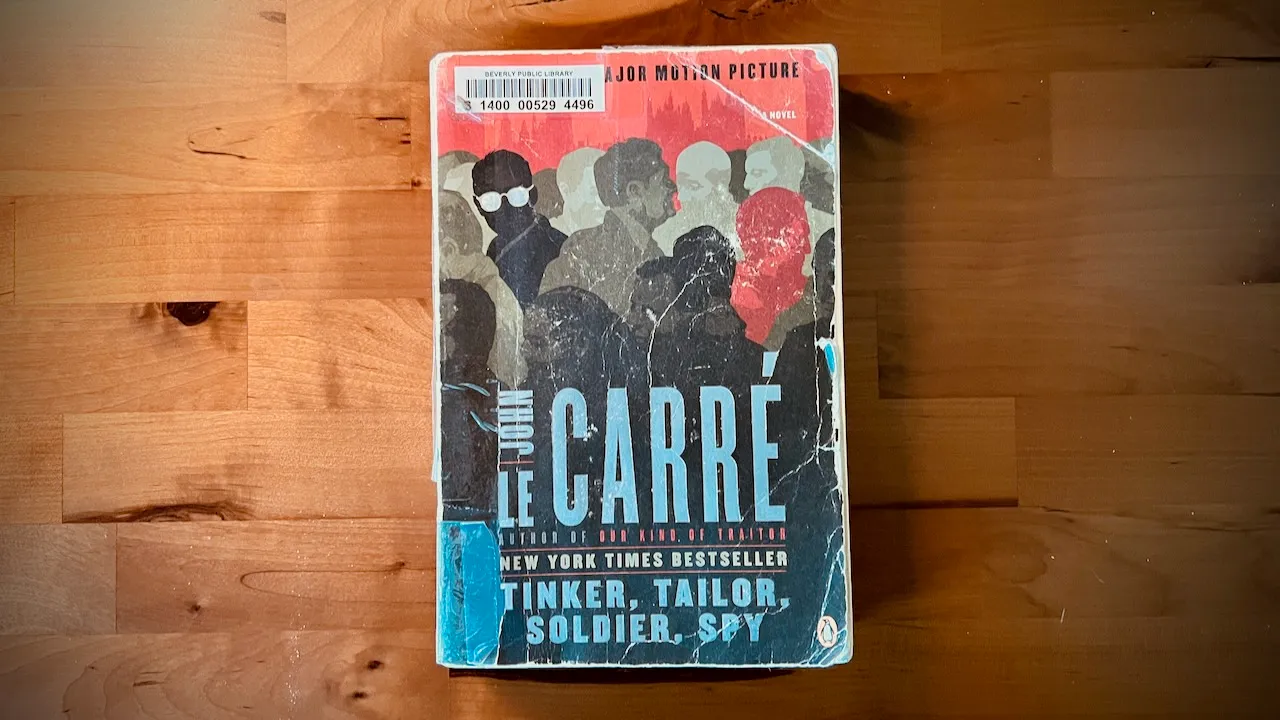
Tinker Tailor Soldier Spy
Back in 2022 I picked up a well-loved copy of The Spy Who Came in from the Cold from our favorite cat rescue / used book store. I’d never read anything by John le Carré, but after his passing in 2020 I saw all these “best of le Carré” lists that had me intrigued. His work is often described as “the opposite of James Bond”, le Carré1 himself worked for MI5 and MI6, and many of the books have a central plot based on real events.
Tinker Tailor Soldier Spy usually comes up first or second on these “best of le Carré” lists. I picked it up at the library recently and finished it this weekend. It’s an interesting book because, to be honest, it’s quite boring. There are entire chapters dedicated to Smiley, a sad, old man, reading through files and remembering what happened in the past. The latter half of the book, when the intrigue picks up, is primarily conversations between two people. After I finished it, I wondered how the heck they made a movie out of it. I vaguely remembered people liking the movie, but hadn’t seen it, so I decided to give it a watch as well.
The book, like the movie, requires you to pay attention. Missing a line (or a scene) doesn’t ruin the ending, but it does rob you of some of the richness of how well woven together the plot is. If any of this post intrigues you, I’d recommend the same thing I did: read the book, then watch the movie. There were a few small parts of the book that I missed in my reading that are made much clearer in the movie, which made me enjoy both a bit more.
There were also some choices in the movie I particularly enjoyed. Nothing here is a spoiler:
- They could have made the scene where Smiley describes his one meeting with Karla a flashback, but Gary Oldman does such a good job of pantomiming the story to an empty chair, and never showing Karla makes his entire existence that much more mysterious.
- Similarly with Ann, who we never see face on. Smiley’s feelings about Ann are relevant to the plot, but even in the book she is presented as more an emotional force guiding conversations than a real person, so this is a fitting treatment.
- Tom Hardy as Ricki Tarr is much more compelling in the movie than in the book. I think in the book he’s presented as another slippery, unreliable source, but in the movie that’s boiled down to Guillam punching him a few times and getting over it.
OK, now some light spoilers
The one thing I didn’t enjoy about the movie was Prideaux’s treatment. His story, both as a teacher and a spy, occupies many pages of the book. I can understand it needed to be condensed to fit the film’s runtime, but the ending of the book is much kinder to him than the ending of the movie. Not to mention Roach never gets any sort of a redeeming moment. It’s one of those things the richness of a book can cover better than the plot beats of a movie.
And now a large spoiler
About 2/3s of the way through, my wife Andrea, who had paid little attention to the film and previously made claims for almost every other character being the mole, declared definitively, after seeing the scene with Bill and Ann in the garden, that Bill was the mole because he couldn’t be trusted.
Well… yes. But there’s more nuance! Isn’t there? Or is that the whole point, Smiley should have known he was a shit from day one. Or maybe did know. Or maybe Smiley should have picked up some romance novels and realized the cheater is awlays the bad guy.
Footnotes
-
A pen name, but interestingly only needed because he wrote his first two books while working for MI6. ↩